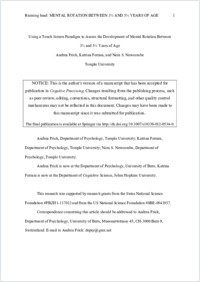Using a touch screen paradigm to assess the development of mental rotation between 3½ and 5½ years of age
- Frick, Andrea Temple University
- Ferrara, Katrina Temple University
- Newcombe, Nora S. Temple University
-
2013
Published in:
- Cognitive Processing. - Springer. - 2013, vol. 14, no. 2, p. 117-127
English
Mental rotation is an important spatial skill. However, there is controversy concerning its early development and susceptibility to intervention. In the present study, we assessed individual differences in the mental rotation abilities of children between 3½ and 5½ years of age, using a touch screen paradigm to simplify task demands. A figure or its mirror image was presented in 8 different orientations, and children indicated in which of two holes the figure would fit by touching one of the holes on the screen. Task instructions were varied in three conditions, giving the children the opportunity to gather manual or observational experience with rotations of different stimuli, or giving no additional experience. Children’s error rates and response times increased linearly with increasing angular disparity between the figure and the hole by the age of 5 years, but 4-year-olds were found to respond at chance for all angular disparities, despite the use of a touch screen paradigm. Both manual and observational experience increased the response accuracy of 5-year-olds, especially for children already performing well. However, there was no effect on 4-year-olds. Results point to an emerging readiness to use mental rotation and profit from observational and manual experience at age 5.
- Faculty
- Faculté des lettres et des sciences humaines
- Department
- Département de Psychologie
- Language
-
- English
- Classification
- Psychology
- License
- License undefined
- Identifiers
-
- RERO DOC 304983
- DOI 10.1007/s10339-012-0534-0
- Persistent URL
- https://folia.unifr.ch/unifr/documents/305967
Statistics
Document views: 74
File downloads:
- FrickFerraraNewcombe_CogProc13_pp.pdf: 206
